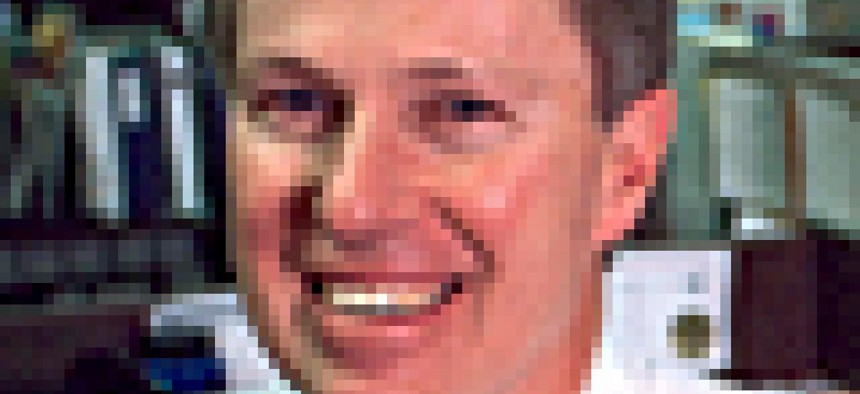HP-Compaq Merger Could Aid Resellers

Hewlett-Packard Co.'s plan to buy Compaq Computer Corp. is good news for GTSI Corp., according to GTSI's chief executive Dendy Young. The merger, said Young, would help his company better compete against what he called "the Dell threat."
Hewlett-Packard Co.'s plan to buy Compaq Computer Corp. is good news for GTSI Corp., according to GTSI's chief executive Dendy Young. The merger, said Young, would help his company better compete against what he called "the Dell threat.""This merger is a combination of two 600-pound gorillas that makes a 1,000-pound gorilla. That's going to make a pretty tough gorilla," Young said. Hewlett-Packard of Palo Alto, Calif., and Compaq of Houston announced Sept. 4 that HP would purchase Compaq in a stock deal initially valued at $25 billion. Pending stockholder approval, the new company, to remain Hewlett-Packard in name, would have combined annual revenue of $87 billion. Channel resellers focused on government sales are tentatively hoping this new gorilla will be a powerful ally to help resellers compete against computer companies that sell their wares directly to customers, such as Gateway Inc., MicronPC LLC and, especially, Dell Computer Corp."It's probably too early to tell what effect this will have on us and our customers," said Gary Sorkin, president of reseller ComTeq Federal, Rockville, Md., a wholly owned subsidiary of PC Connection Inc., Merrimack, N.H. Sorkin said he will be watching the new company closely to see if it will help ComTeq "be effective at competing against the directs."According to Input Inc., a Vienna, Va., IT market research company, as of Aug. 1., Round Rock, Texas-based Dell has tallied up a monster $668 million for 2001 purchases on the General Services Administration's information technology schedule. During that same time, MicronPC secured $122 million in sales, and Gateway $90 million.In comparison, GTSI, the largest government reseller, racked up $87 million in GSA-related sales through Aug. 30. The company's total revenue for 2000 was $677.8 million, of which 90 percent was to the federal government.Traditionally, much of government sales of IT equipment has gone through resellers, said Brian Alexander, an analyst with investment firm Raymond James and Associates, St. Petersburg, Fla. who covers the reseller market. "Typically, manufacturers can't sell direct to small organizations effectively, because it's a fragmented customer base with a small order size," Alexander said. "That's when the channel comes into play. These companies leverage costs over a wide base of suppliers and customers."However, companies such as Dell have been making inroads into this market through relentless cost cutting and tighter inventory controls. It is widely assumed among analysts that Dell's tight control of its supply chain was one of the factors that drove HP and Compaq to merge. "Both of those companies have been losing money on PCs for the last few quarters because of Dell's aggressive pricing," Alexander said. "So, by merging the two companies, the hope would be that they would be a more formidable competitor." Dell officials agreed it has been able to offer low prices to government customers. "Our operating expenses, as a percent of revenue, are almost half of that of Compaq. HP is 2.5 times our cost structure," said Mike Maher, spokesperson for Dell. "We have a lot more flexibility in how to provide products to customers."Dell does not break out government sales, though Maher said unit shipments for the company as a whole increased by 19 percent in the second quarter of 2001, ending July 31. The largest growth area for the company, he said, is in enterprise servers, which has increased 33 percent in shipments for four quarters through the second quarter of 2001. As a result, Dell will not change its course to prepare for the bulked-up HP. "Our focus is not on what our competitors are doing, but rather on continuing to grow," Maher said. "We're the only company that is profitable."Channel resellers expressed hope that the combination of HP and Compaq would counter the Dell juggernaut. "Compaq's volume orientation and HP's quality [control] will make for a very formidable competitor in the marketplace," Young said. He said approximately 30 percent of GTSI's sales come from either HP or Compaq products. More cautious optimism was expressed by representatives of CDW-G, the government-focused subsidiary of reseller CDW Computer Centers Inc., Vernon Hills, Ill., and Insight Enterprises Inc., Tempe, Ariz."It's too early to tell," said Karen McGinnes, senior vice president of finance for Insight. "We have great relations with HP and Compaq. Compaq has been aggressive in helping us to be competitive with Dell. If the merger is successful, and they are able to cut costs with a more efficient operation, that can only help everyone."Wall Street has not responded well to HP's proposed acquisition of Compaq. Officials said the combined companies would be better equipped to innovate and compete, but critics questioned if the merger would really help either company.After the announcement, HP's share price fell more than 20 percent in one week, closing at $17.89 Sept. 11. The value of the planned acquisition fell proportionately to less than $20 billion.Despite resellers' hopes regarding the merger, analysts also said there are some potential downsides for resellers. "The negative is that top two suppliers have joined hands, so now there's an increased amount of concentration on the supplier base," Alexander said. "Before, a channel company might have had the ability to play one company off another. Well, it doesn't have that ability anymore."HP also will likely be distracted by a considerable effort to combine the two product lines, said Tom Meagher, vice president of equity research with BB&T Capital Markets, Richmond, Va. "They have to rationalize their product line," he said, adding that they must do so quickly in order to remain competitive. ComTeq's Sorkin agreed: "The key is for HP to do the integration quickly and effectively, and combine the offering so that it enhances the offerings to the customer."


Dendy Young
NEXT STORY: Accelerating Security